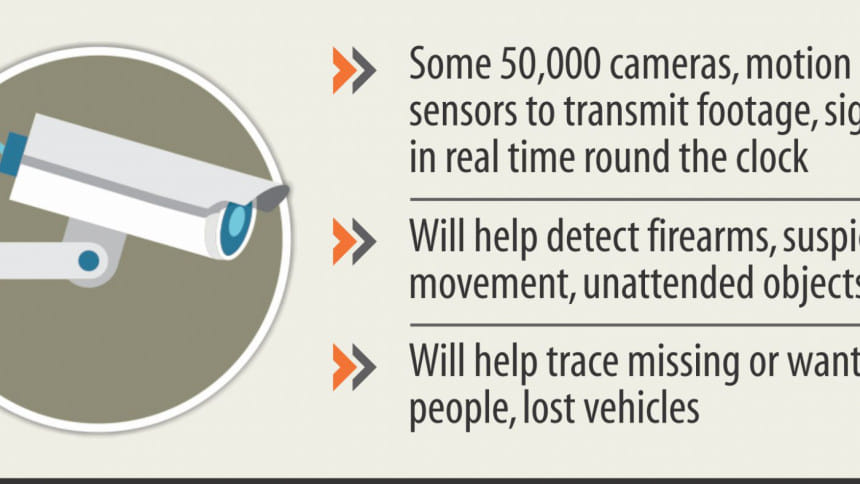Mega plan for surveillance

The government is planning to bring the entire Dhaka city under video surveillance under an ambitious project to ensure better safety and security as well as combat crimes.
The finance ministry has recently agreed to fund the Tk 5,000-crore project to be implemented by the police, after a similar scheme taken up in 2007 failed due to fund crunch, technical glitches and lack of expertise, sources said.
Under the new project, police will install 50,000 closed-circuit television (CCTV) cameras and motion sensors across the capital.
These cameras and devices will transmit footage and signals to the police control room in real time round the clock, alerting the police about any suspicious gathering or movement and any objects or bags kept unattended at a place for over 15 minutes.
The surveillance system will also help detect firearms, trace missing vehicles or lost devices, control traffic and track down wanted or missing people, according to officials at the police headquarters.
The proposal is now with the home ministry for further scrutiny, Gazi Mozammel Hoque, assistant inspector general (development) of the PHQ, told The Daily Star.
After home ministry's approval, the project proposal titled Development of Dhaka City Digital Monitoring System will be sent to the planning ministry. From there, the proposal will be placed before the Executive Committee of the National Economic Council (Ecnec) for its approval.
“When implemented, Dhaka city's law and order will see a tremendous change. People will feel safer. Foreigners will also feel safe to visit the country and invest,” said AKM Shahidur Rahman, deputy inspector general (finance) of the police headquarters.
The police headquarters had sent the proposal to the home ministry back in 2013, but it gathered dust at the ministry for more than two years. The file started moving at a faster pace after the Gulshan café attack in July last year, said an official at the police HQ.
Once the cameras and other surveillance devices are installed, some 550 specially trained officials will monitor the system on 60 large monitors from the Central Command and Control centre at the Dhaka Metropolitan Police office in the capital's Abdul Gani Road.
There will be five types of cameras -- bullet camera (small in size), dome camera (for wide range view), PTZ camera (for little details), checkpoint camera and traffic monitoring camera. Primarily, 16,000 cameras will be installed and the rest will be set up in phases, officials said.
Such a project is not new in the city, however. Between 2007 and 2010, the DMP installed 155 CCTV cameras at 59 points of the capital under a Tk 61-crore scheme.
But the cameras remain useless most of the time as they cannot transmit the captured images through wireless connection due to technical glitches. They are also unable to capture images after sunset, according to DMP sources.
Last year, the Lalbagh division of the DMP set up 3,340 CCTV cameras in Old Dhaka with funds from businesses and community people. Half of these cameras send blurry images, meaning they are not of much help, according to the sources.
In another move, police set up 883 CCTV cameras since 2014 with money from the community people in Dhaka North City Corporation area and plan to install some 350 more.
Sharmin Afroz, systems analyst of the DMP, said all CCTV cameras already installed by the police with community funds would be integrated with the new mega project.
SEPARATE BANDWIDTH
Under the mega project, police for the first time will get a separate bandwidth for smooth operation of the surveillance cameras and some 12,000 improvised wireless sets. Some of these wireless sets would be able to transmit video.
“We already have a successful meeting with Bangladesh Telecommunication Regulatory Commission for a separate bandwidth for police, and the process is underway,” said Mozammel, the AIG.
Profiles of all criminals, details of all criminal cases and footage of major incidents will be preserved in the server accessible to 11 security and law enforcement agencies, he said.
Besides, all the 49 police stations under the DMP will get notification from the central command centre.
MOBILE MONITORING CENTRE
There will be at least two specialised vehicles that will serve as mobile monitoring centres. Each of these vehicles will have equipment capable of monitoring footage from 50 CCTV cameras.
In case of an emergency, these vehicles will take position at the scene, for example at a political rally, and monitor the situation from inside the vehicles through the CCTV cameras.
TRAFFIC CONTROL
The traffic control cameras will keep an eye on capital's traffic movement round the clock. Specially designed cameras will send signals to the control room in case of a huge tailback on a certain street, according to the proposal.
These cameras will also help track down vehicles wanted by the police by analysing the number plates, said Mozammel.
Once the cameras are installed, traffic police officials will not need to file any cases or collect fines from vehicle owners. Every vehicle owner will be provided a prepaid card from where the fine amount will be automatically charged.
“The moment a vehicle breaks traffic rules, the camera will detect it analysing the chip installed in the digital number plate,” Mozammel added.
FACE RECOGNITION
A special sensor with the CCTV cameras will read faces.
“The cameras will start searching for faces as per the demand of the central command centre. Upon detection, they will send signals to alert the local police station with the precise location of the person,” said an official of the PHQ.
If someone visits a certain place for three days in a row or wait at a specific location for long or if he looks suspicious, the surveillance system will send signals to the central command centre and the local police.
SOUND DETECTCTION
The motion sensors will have the capacity to detect specific sounds and locations. After a gunshot, for instance, the motion sensors will alert the central command centre with details of the sound, its origin, the spot and the hitting point, said Mozammel.
These sensors will also be able to detect any kind of theft or suspected device.

 For all latest news, follow The Daily Star's Google News channel.
For all latest news, follow The Daily Star's Google News channel. 








Comments